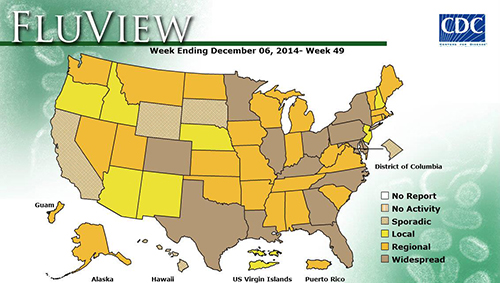This map indicates the spread but not the severity of influenza

The week before Thanksgiving, influenza (AKA the Flu), infiltrated the ranks of Team Jester and took us down one by one. Anecdotaly speaking, many friends have had the same experience and one of the moms on the basketball team I coach told me they considered shutting Wesleyan down for a few days due to the spread of the Flu.
On that note, allow me to spread (so to speak) the CDC’s Guidance to Help Reduce the Spread of the Flu in K-12 Schools.
Background
Flu seasons are unpredictable in a number of ways. Although widespread flu activity occurs every year, the timing, severity, and duration of it depend on many factors. The timing of flu can vary from season to season. In the United States, seasonal flu activity most commonly peaks in the U.S. between December and February.
High-Risk Groups
School-aged children are a group with a high rate of flu illness. Vaccination to prevent influenza is particularly important for people who are at high risk of serious complications from influenza. See People at High Risk of Developing Flu-Related Complications for a full list of age and health factors that confer increased risk.
Symptoms and Emergency Warning Signs
The symptoms of flu can include:
- Fever (although not everyone with flu has a fever)
- Cough
- Sore throat
- Runny or stuffy nose
- Body aches
- Headache
- Chills
- Tiredness
- Sometimes diarrhea and vomiting
Emergency warning signs that indicate a person should get medical care right away include:
- In children:
- Fast breathing or trouble breathing
- Bluish skin color
- Not drinking enough fluids
- Not waking up or not interacting
- Being so irritable that the child does not want to be held
- Flu-like symptoms that improve but then return with fever and worse cough
- Fever with rash
- In addition to the signs above, get medical help right away for any infant who has any of these signs:
- Being unable to eat
- Has trouble breathing
- Has no tears when crying
- Has significantly fewer wet diapers than normal
- In adults:
- Difficulty breathing or shortness of breath
- Pain or pressure in the chest or abdomen
- Sudden dizziness
- Confusion
- Severe or persistent vomiting
- Flu-like symptoms that improve but then return with fever and worse cough
See The Flu: What to Do If You Get Sick.
Recommendations From the CDC
- Get a yearly flu vaccine.
- Take everyday preventive actions to stop the spread of germs.
- Stay home when sick
- Cover your cough
- Handwashing: Clean hands save lives.
- Disinfect schools to help slow the spread of flu.








 “Extremism in defense of liberty is no vice. Moderation in pursuit of justice is no virtue.”
“Extremism in defense of liberty is no vice. Moderation in pursuit of justice is no virtue.”